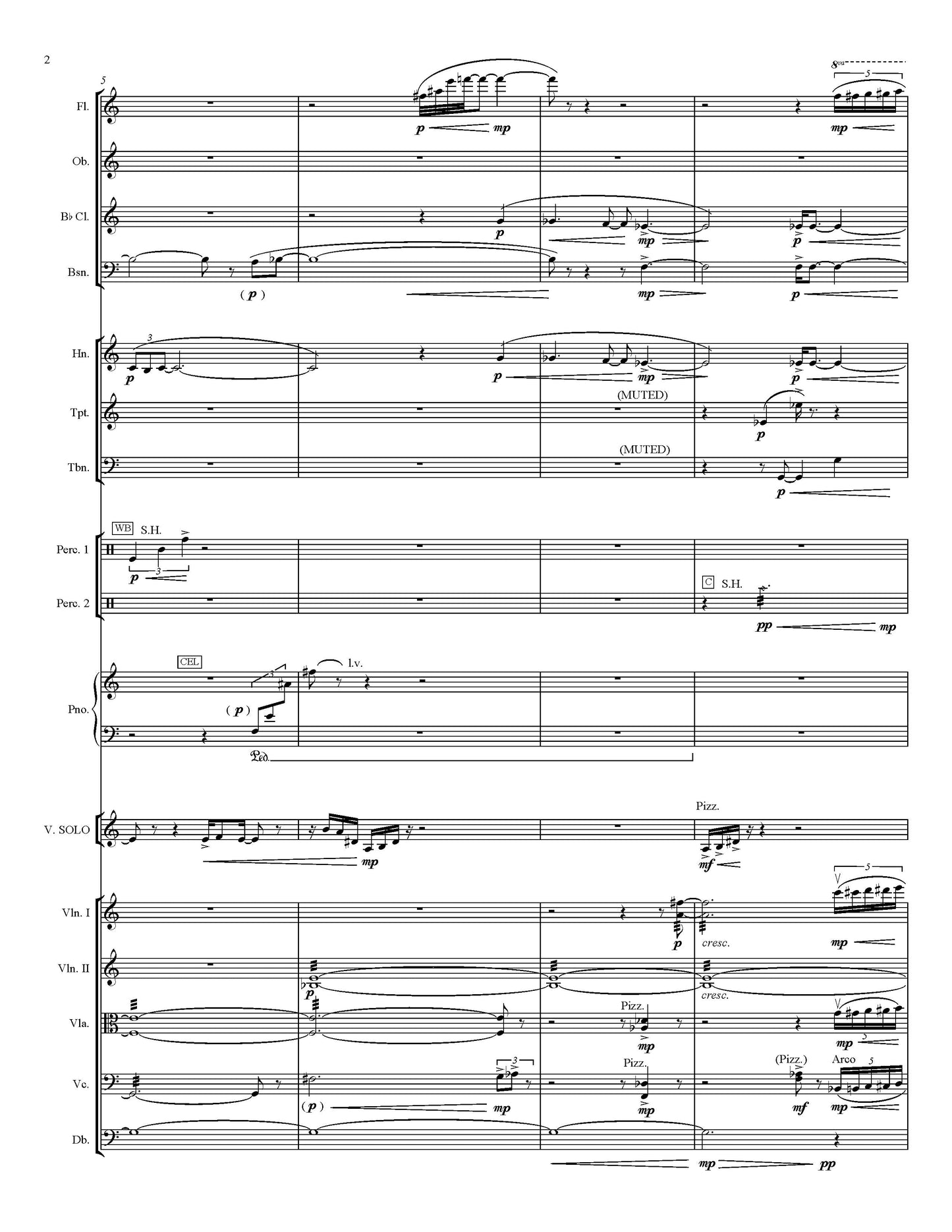Elliott Schwartz » CHAMBER CONCERTO VI: MR JEFFERSON
CHAMBER CONCERTO VI: MR JEFFERSON
CHAMBER CONCERTO VI: MR JEFFERSON
Violin solo, chamber orchestra 1-(Picc)-1 (E.H.)-1 (Bass Clar)-1 (CBsn), 1-1-1-0, Percussion (1 or 2 players), piano (doubles on harpsichord & celesta), strings.
Chamber Concerto VI: Mr. Jefferson for solo violin and chamber orchestra is built on references to, and associations with, the figure of Thomas Jefferson. It is dedicated to violinist Peter Sheppard Skaerved, who first stimulated my interest in Jefferson's musical connections. In composing the work, I focused on four specific links to Jefferson.
(a) The formal structure, in five connected movements, is meant to reflect Jeffersonian architecture: the symmetrical balancing of components on either side of a central structure. Thus the middle (third) movement is balanced on either side, with movements I-V, and II-IV, of identical durations.
(b) The piece makes use of motives based on musical spellings, using the letters A through G plus the German H and S and solfege syllables. The most prominent motive of this type is based on the pitches THOMAS EFFERSO. There are musical spellings of many other names as well -- including that of violinist Peter Sheppard Skaerved.
(c) There are many quoted fragments of 18th century music associated with 7 Jefferson -- works that he kept in his music library, works that he performed, and/or works which were composed by a person very close to him. (d) The five movements -- all connected -- provide programmatic commentaries on this remarkable historic figure. In order, the movements are:
(1) The Inventor, which celebrates TJ's remarkable skill at designing machines. Among the many objects he either created or improved upon: the swivel chair, plow, automatic writing polygraph, clock, dumbwaiter and sundial. This movement introduces the Jefferson-spelling motive, reference to Bach Inventions, and a four-note motive"”the motive of "Uranus the Magician" in Holst's The Planets.
(2) The Violin, honoring TJ's passion for music and his devotion to the violin. He owned several instruments (one of which was a 17th century Amati), practiced three hours a day as a young man, and maintained a large library of scores including works by Vivaldi, Corelli, Handel and Haydn. This movement places the violin soloist in sharp focus; near its close, the soloist plays fragments from works which were in Jefferson's library.
(3) Garden, reflecting Jefferson's devotion to horticulture. In typical Enlightenment fashion, he was insatiably curious about the workings of nature, and cultivated a great variety of fruits, vegetables, trees and flowers at Monticello. The music becomes "flowery," with special emphasis on ornaments, embellishments and tiny motives that undergo a growth process.
(4) The Letter, which refers to TJ's correspondence with Mariah Cosway, the great love of his later life. Cosway was an accomplished painter, flutist and composer -- and (unfortunately) married. Here the concerto becomes more overtly Romantic in style -- chromatic, orchestrally lush and curiously Wagnerian. Fragments of Cosway's own music for flute and harpsichord surface within the texture.
(5) The Portrait, last of the five connected movements, stands for Gilbert Stuart's portrait of Jefferson which hangs in the Bowdoin College Museum of Art. James Bowdoin III commissioned the Jefferson portrait and then willed it to the newly founded College which bore his family name. This movement serves as the Recapitulation of all that has gone before --culminating in an emphatic return of Holst's four-note "magician" figure, a fitting epitaph for a remarkable man. ---Elliott Schwartz
Authored (or revised): 2007
Duration (minutes): 16
Book format: conductor's score
SKU
ACA-SCHW-001Subtotal
$53.00Couldn't load pickup availability








